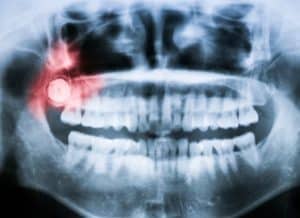Wisdom teeth, or “third molars,” are typically the last teeth to emerge in the mouth. These four teeth usually begin to grow in around the ages of 17 to 25, but sometimes they are unable to fully surface in the mouth due to blockage from other teeth, which can lead to serious problems if left untreated.
Known as impacted wisdom teeth, these blocked wisdom teeth require immediate attention from a dental health professional. We’ll define what impacted wisdom teeth are, discuss how to tell if wisdom teeth are impacted, and identify what steps to take if you have them.
What is an Impacted Wisdom Tooth?
An impacted wisdom tooth is a wisdom tooth that is unable to fully surface in the mouth due to blockage from other teeth. As the tooth tries to grow in, it may twist or tilt and cause other teeth to move. Sometimes, the tooth may stay under the gums entirely; other times, it may partially surface.
While common, impacted wisdom teeth can lead to some serious health issues if left untreated, including overcrowding of teeth, gum disease, damage to other teeth, and tooth decay. But how do you know if your wisdom teeth are impacted, especially if you can’t see them? We’ll talk about some signs and symptoms of impacted wisdom teeth and how regular dental checkups can help catch these signs early on.
Symptoms of Impacted Wisdom Teeth
There are oftentimes no visible signs of impacted wisdom teeth, especially if they are fully beneath the gums. However, impacted wisdom teeth symptoms may include pain, swelling and bleeding around the gums, as well as headache or jaw stiffness. Some people may even experience a foul taste in the mouth while eating.
Again, some sort of pain or discomfort is the most noticeable symptom. If this is the case, pain can be managed with over-the-counter pain relievers such as ibuprofen or acetaminophen. Swishing warm salt water in the mouth can also help to alleviate swelling. However, it’s imperative that you get to a dentist right away if you suspect you may have impacted wisdom teeth.
Dentists will typically begin screening patients for wisdom teeth growth around their teenage or young adult years to identify any potential problems and better prepare patients for treatment should impacted wisdom teeth begin to grow. Again, this is why it’s important to keep up with regular dental screenings, especially during these formative years.
Impacted Wisdom Teeth Treatment
Impacted wisdom teeth that cause pain or other issues for patients are typically removed through outpatient surgery. In many cases, dental professionals will recommend that impacted wisdom teeth, regardless of if they are causing pain or not, be removed in order to prevent any potential issues from arising down the road.
If you suspect you have impacted wisdom teeth, visit your dentist for a screening. Your dentist will ask you a series of questions about your symptoms and dental hygiene habits, and then examine your mouth and take X-rays to determine if you have impacted teeth.
If your dentist gives you the go-ahead for surgery, you will be referred to an oral surgeon who can perform the procedure. During the procedure, you will receive some sort of anesthesia. Some patients may receive local anesthesia which numbs the tooth area; others may receive sedation or general anesthesia. Every patient is different, so it’s important to discuss with your doctor for details specific to your case.
After anesthesia, the oral surgeon will begin the extraction. Once the tooth (or teeth) has been successfully removed, he or she may use stitches to close the wound and place gauze in the mouth.
After the procedure, you may experience some pain and swelling or bleeding around the mouth, which may last for a few days. Your oral surgeon will give you explicit instructions on how to care for your mouth post-treatment and may prescribe you medication to help you cope with pain.
Recovery time varies from person to person and depends on how many impacted teeth have been removed — typically, recovery takes three or four days but can last up to one week in some cases. Again, it’s important to follow all instructions set forth by your oral surgeon closely to make your recovery as seamless as possible.
Impacted Wisdom Teeth: The Takeaway
Every person’s mouth is different. While some individuals may have impacted wisdom teeth without any issues, oftentimes dentists and oral surgeons will recommend their removal to prevent problems from cropping up in the future.
If you live in the Boulder, Colorado, area and would like to schedule a screening for impacted wisdom teeth, contact us to set up an appointment. We’d be happy to help put you on the path to better dental health.

